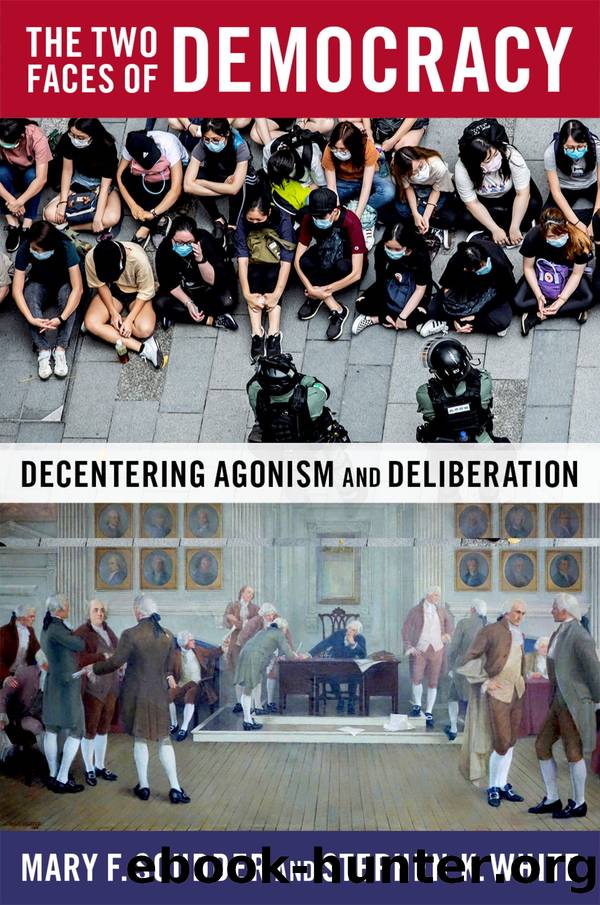The Two Faces of Democracy by Mary F. Scudder;Stephen K. White;

Author:Mary F. Scudder;Stephen K. White;
Language: eng
Format: epub
Publisher: Oxford University Press USA
Published: 2023-06-15T00:00:00+00:00
5
Re-envisioning the Core of Democracy
A full comprehension of democracy must encompass what we have called its two faces. As we have shown, however, neither the deliberative nor the agonistic approaches seem capable, by themselves, of accommodating the full range of values that emerge from the intuitive draw of these two faces. A more adequate approach must clarify the value of reason and civil discussion, on the one hand, and contention and conflict, on the other hand, as well as show how they are interwoven. In order to move toward that goal, we will have to think in a fashion that substantially decenters the claims of both deliberation and agonism. In the former case, the need for rethinking arises from the accumulation of serious challenges, both internal and external, to its prevailing self-understanding of the character and role of deliberation in political life. In the latter, a comparable deficiency arises from a failure to provide a better accounting of the values of equality and autonomy to which it tacitly appeals as sources for the moderation of the slide toward unmitigated conflict. In both cases, rectifying these deficiencies requires a better account of the moral core of democratic life.1 Only after that has been provided will we have an adequate grasp of why we feel the orienting force of both faces of democracy: the one displaying the hold on our intuition of scenes of speaking, listening, debating, arguing, and voting; and the other displaying the hold of scenes of protest and resistance to undemocratic forces.
What would a better articulation of the ethical-political core of democracy look like? An effective answer to this question must proceed on two levels. Obviously, it requires an account of exactly what we take this core to be. But for that sketch to be plausible, we must first clarify what the very idea of such a foundation in our present âpost-foundationalâ world can mean. In short, what sort of character and validity could it have? How should political reflection today understand its most originary gestures both in regard to their conceptual claims and to their sources of affective force? Only after such general questions have been addressed, can we then proceed to tackle the specific one of sketching a basis for our communicative model of democracy. In this chapter we take on the former task, while in Chapter 6 we tackle the latter.
There exists today a distinct presumption, often operating implicitly, that reflection on political life must proceed in a âpost-foundationalâ sense; that is, there is no longer a universal belief in a strong ontological, moral-religious basis for political life, such as the one that sustained Lockeâs thinking. The prefix âpostâ implies for many today that we are somehow beyond such matters, in the sense that we no longer need to be bothered with carefully discussing things on this terrain of what used to be called âfoundations.â This aversion, avoidance, or reticence in regard to foundational issues can be seen in a variety of maneuvers. Consider, for example,
Download
This site does not store any files on its server. We only index and link to content provided by other sites. Please contact the content providers to delete copyright contents if any and email us, we'll remove relevant links or contents immediately.
Chaco's Northern Prodigies : Salmon, Aztec, and the Ascendancy of the Middle San Juan Region after AD 1100 by Paul F. Reed(338)
Law Enforcement Interpersonal Communication and Conflict Management by Brian Douglas Fitch(331)
Digital International Relations by Unknown(324)
Critical Perspectives on Human Security : Rethinking Emancipation and Power in International Relations by David Chandler; Nik Hynek(315)
The Enduring Color Line in U.S. Athletics by Krystal Beamon Chris M. Messer(309)
Skilled interpersonal communication: Research, theory and practice, Fifth edition by Owen Hargie(309)
Evidence-Based Policy Making in Labor Economics by Hamermesh Daniel S.;Nottmeyer Olga K.;Nottmeyer Olga;King Sarah;King Sarah;King Sarah;(277)
EPSO CAST Political affairs EU policies: How to succeed in the selection procedure by Franco Reverte José María(272)
Writing Public Policy - A Practical Guide to Communicating in the Policy Making Process by Catherine F. Smith(256)
Threshold Concepts in Women's and Gender Studies by Christie Launius Holly Hassel(249)
Criminological Theory in Context by John Martyn Chamberlain(249)
Tibeton Yoga Its Secret Doc by Evans-Wentz(245)
Positive Psychology and Spirituality in Counselling and Psychotherapy (Conflict, Ethics, and Spirituality, 12) by unknow(245)
Rothschild and Early Jewish Colonization in Palestine (Geographical Perspectives on the Human Past) by Ran Aaronsohn(244)
Social Problems, Social Issues, Social Science by James Wright(243)
Play in child development and psychotherapy: toward empirically supported practice by Sandra W. Russ(239)
Cognitive Development in Infancy and Childhood (Elements in Child Development) by Mary Gauvain(235)
Latin American Politics and Society by Gerardo L. Munck & Juan Pablo Luna(208)
What Makes a Social Crisis?: The Societalization of Social Problems by Jeffrey C. Alexander(206)
